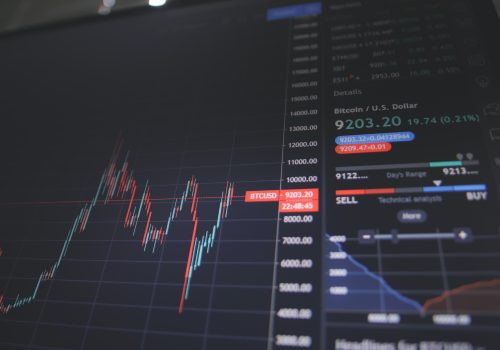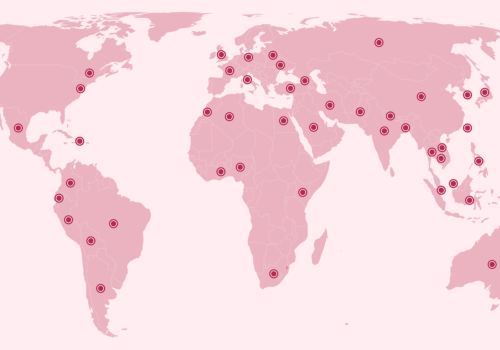Carole House testifies to the House Financial Service Committee on approaches to combat crypto crime and illicit activity
On February 15, Non Resident Senior Fellow Carole House testified to the US House Committee on Financial Services. Below are her prepared remarks for the committee on crypto crime and illicit activity.
Thank you Chairman Hill, Ranking Member Lynch, and distinguished members of the subcommittee, for your leadership in holding this hearing and the honor of the invitation to testify. My name is Carole House. I am a Nonresident Senior Fellow at the Atlantic Council, an Executive in Residence at Terranet Ventures, and Chair the CFTC’s Technology Advisory Committee (TAC).
Most of my career has been at the intersection of national security, emerging technologies, and finance. I have served in the US Army, the Senate Homeland Security and Governmental Affairs Committee (HSGAC), and FinCEN. I also served two tours in the White House, including most recently at National Security Council (NSC) where I supported initiatives like the US Counter-Ransomware Strategy and President Biden’s Executive Order on Ensuring Responsible Development of Digital Assets.
Innovation is core to the US economy, but we have learned that responsible innovation does not mean unchecked technological advancement without regard to implications for society, security, and democratic values. Cryptocurrency remains a serious risk for illicit finance. It is not inevitable for the sector to always be that way, but the unique aggregate features of crypto compounded by the existing state of compliance domestically and abroad have cultivated an environment ripe for exploitation by rogue nations and fraudsters. There are mitigating measures like transparency that are helping to combat illicit finance, but critical and timely steps are needed to make best use of them. The status quo has not yielded benefits for consumers, the evolving DeFi ecosystem, or US leadership.
Core to cryptocurrency’s appeal to both licit and illicit users is its ability to transfer significant value peer-to-peer, pseudonymously, immutably (or irreversibly), with global reach, with increased speed and cost efficiencies.1Security consultant Alison Jimenez described these features as ability to move funds “far, fast, in large amounts, irreversibly, anonymously, and to a third party.” See Alison Jimenez, written testimony to House Financial Services Committee Subcommittee on Digital Assets, Financial Technology, and Inclusion, Hearing on Crypto Crime in Context- Breaking Down the Illicit Activity in Digital Assets (November 15, 2023).
The absence or reduction of financial intermediaries and central points of control in more highly decentralized cryptocurrency systems also challenges clear lines of responsibility and accountability that are crucial in managing risks in high value, high risk sectors like finance.
A risk-mitigating feature of cryptocurrencies is their often public and transparent nature.2See United States District Court for the District of Columbia, Case No. 20-sw-314 (ZMF), In the Matter of the Search of One Address in Washington, D.C., Under Rule 41 (January 6, 2021). However, aside from concerns about consumer privacy, there are limitations to this transparency–ranging from off-chain data to the use of obfuscation methods like mixing, chain-hopping, and encryption.3For example, off-chain data could include internal cryptocurrency exchange activity or transactions conducted off-chain over the Bitcoin Lightning Network via a Lightning channel. 4See FinCEN, Advisory FIN-2019-A003, “Advisory on Illicit Activity Involving Convertible Virtual Currency” (May 9, 2019). The same extent of transparency we see today is also not inevitably a part of these systems, given growing experimentation to integrate privacy enhancing technologies (PETs).
With these features and the lagging state of non-compliance in mind, cryptocurrency remains attractive to a full spectrum of illicit actors.
- It is a favored tool of cybercriminals and the predominant means of payment in sophisticated ransomware-as-a-service (RaaS) economies targeting critical infrastructure like energy and hospitals, extorting at least one billion dollars last year alone.
- The Biden Administration also reported that North Korea funds about half of its proliferation regime via cybercrime and cryptocurrency theft.5See Sean Lyngaas, CNN, “Half of North Korean Missile Program Funded by Cyberattacks and Crypto Theft, White House Says” (May 10, 2023).
- Despicable pig butchering and investment fraud schemes continue to harm consumers, with over nine billion dollars reported in fraud in 2022.6See TRM Labs, “Illicit Crypto Ecosystem Report” (June 2023).
- Cryptocurrency is one in a suite of tools used in many forms of transnational organized crime, including drug and human trafficking, as well as terrorism financing and sanctions evasion and offset.7See Elliptic, Elliptic Research, “Chinese Businesses Fueling the Fentanyl Epidemic Receive Tens of Millions in Crypto Payments” (May 23, 2023). 8See FBI, Public Service Announcement, I-052223-PSA, “The FBI Warns of False Job Advertisements Linked to Labor Trafficking at Scam Compounds” (May 22, 2023). 9See Elliptic, 2023 Report, “Sanctions Compliance in Cryptocurrencies” (2023). 10See USDOJ, USAO, Eastern District of New York, “Five Russian Nationals and Two Oil Traders Charged in Global Sanctions Evasion and Money Laundering Scheme” (October 19, 2022).
There are also national security concerns implicated by diminished leadership in driving responsible financial and technology experimentation when adversarial nations have for years been pursuing alternative financial systems and developing building blocks for the next phase of the internet.
In light of the threat, policymakers must consider what to do about it. The CFTC TAC recent report on DeFi outlined opportunities for approaching accountability, such as building in compliance features at different layers across the DeFi tech stack, as well as considering ongoing infrastructure provider-focused regulations developing at DHS and Commerce. Despite some calls for equivalent privacy and neutrality treatment of DeFi as we give the internet, I encourage consideration that financial versus information activity carries different levels of risk. “Neutrality” is not an acceptable position to take toward illicit finance.
I’ll offer some opportunities to consider for combating crypto crime:
- Enhance regulatory and enforcement agencies’ capability to take action against egregious violators of our illicit finance framework, such as through prioritized funding for agencies and honing disruption authorities like FinCEN’s 9714 and 311 designations.
- Next, promote international action on combating illicit cryptocurrency activity in priority jurisdictions through diplomacy and capacity building.
- Third, enhance outcome-oriented public-private partnerships for information sharing and R&D.
- Finally, promote development of secure, trustworthy, and interoperable digital identity infrastructure.
Thank you again for the opportunity to speak on this issue, I look forward to your questions.
Related content

At the intersection of economics, finance, and foreign policy, the GeoEconomics Center is a translation hub with the goal of helping shape a better global economic future.
Image: July 18, 2022. Dramatic view of the United States Capitol Building in Washington DC. iStock.



